Items
topic_interest is exactly
burnout
-
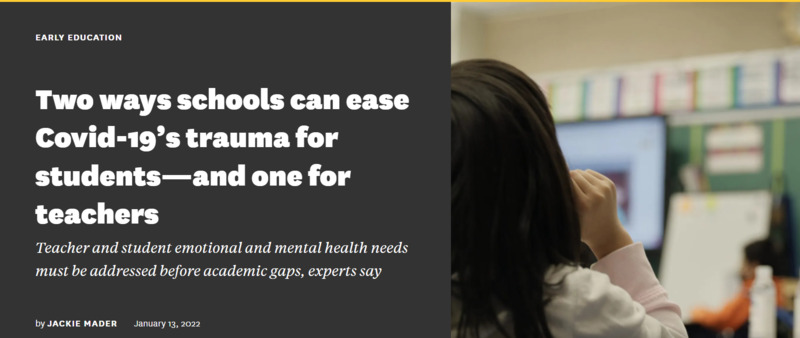 2022-01-13
2022-01-13Addressing Trauma from COVID-19 on Students and Teachers
COVID-19 has had a huge impact on both students and teachers. Not only has there been learning gaps, but there has also been an impact on the social and emotional well-being of teachers and students. Many experts now say that these issues need to be addressed before focusing more on academics. -
 2022-02-01
2022-02-01More than Half of Teachers Looking to Quit Due to COVID
According to a poll given by the National Education Association, 55% of teachers who participated feel burned out enough from COVID-19 to quit. Some of the reasons that COVID-19 has caused additional stress for teachers is due to student behavior, additional responsibilities, and longer hours. -
 2022
2022Teacher Burnout is Real
826 National is a non-profit organization focused on helping students with their writing skills. In this post, they highlight statistics related to teacher burnout and stress during the second year of the pandemic. One of the most alarming statistics is that 90% of teachers that participated say that teacher burnout is a serious issue. The pandemic has exacerbated the stress put on educators and they have received little support in return. -
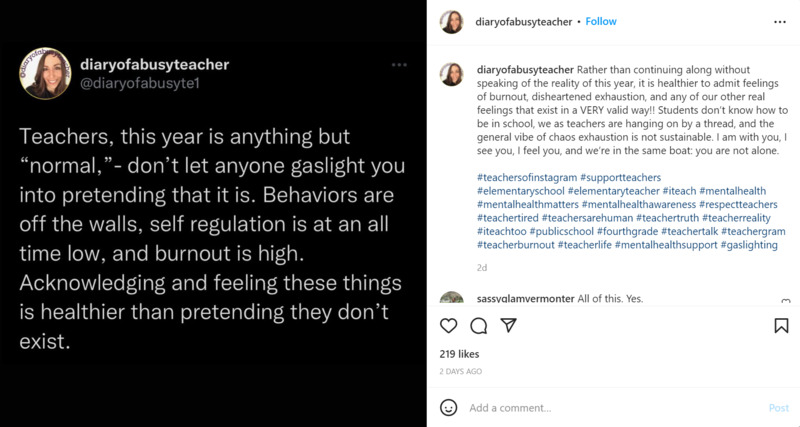 2022
2022Not a Normal Year for Teachers
This post shows an example of teachers supporting each other through the end of the 2022 school year. In many different places, people are acting as if life is "normal" again. Schools are not requiring masks or sanitation procedures, school is in session like normal, in-person assemblies, activities, and sports are occurring. However, teachers can definitely tell that everything is not normal, and our job continues to be increasingly more difficult. -
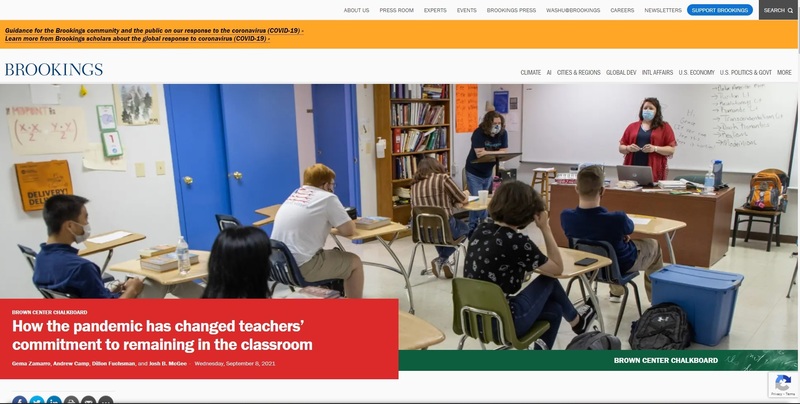 2021-09-08
2021-09-08How the Pandemic Has Changed Teachers' Commitment to Staying in the Classroom
According to the article, there was a 16% national turnover rate for teachers before the pandemic. A survey given in January 2021 shows that almost 25% of teachers stated that they wanted to leave teaching. Pre-pandemic surveys and surveys given during the pandemic also show that less teachers believe that they will stay in education until retirement. The pandemic has required that teachers maintain the same responsibilities, while also piling on constant communication with parents (even without a response), social-emotional lessons, plans for asynchronous and synchronous learning, teaching students virtually and in-person at the same time, keeping up with changing health and safety regulations, and having to deal with increasing behavior issues. -
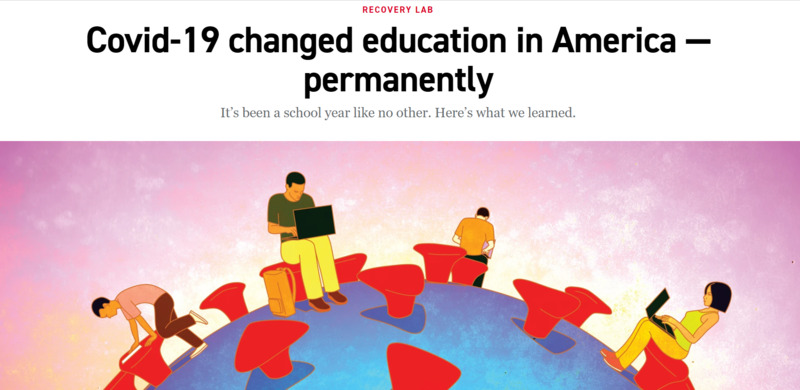 2021-04-15
2021-04-15COVID-19 Changed Education in America
The pandemic has completely changed education. Students' views and attitudes towards school has changed, as well as been impacted by trauma and lack of normal school routine. School districts and teachers have been scrambling to accommodate to the new change while also trying to maintain a feeling of being "normal" during a pandemic. -
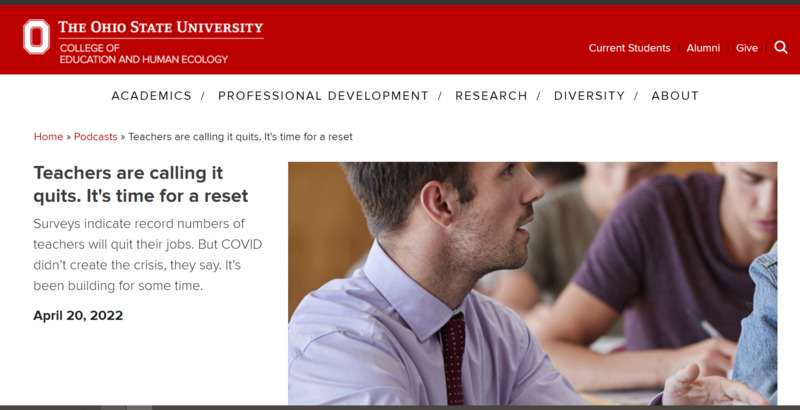 2022-04-22
2022-04-22Teachers Are Calling It Quits
Before the pandemic, teachers already experienced a job where they are overworked, often underpaid, and underappreciated. This article details rising frustrations by teachers during the pandemic and the subsequent leaving of many people from education. -
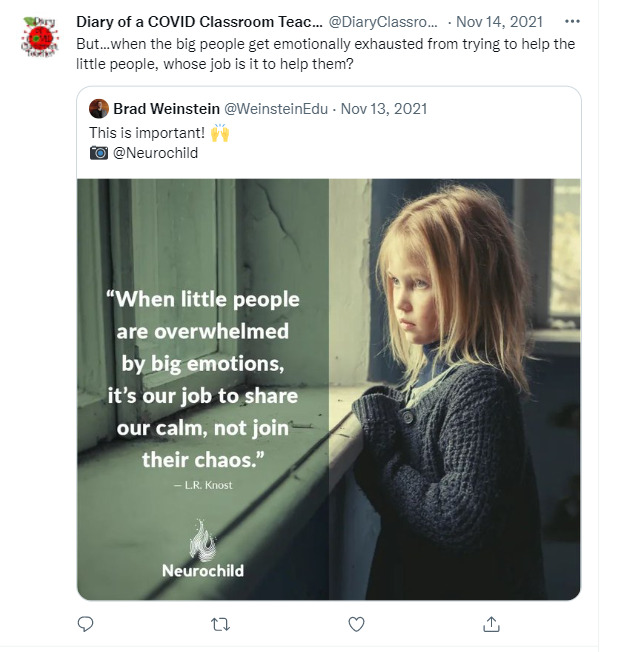 2021-11-14
2021-11-14Emotionally Exhausted Teacher
This item is a screenshot from a Twitter account known as the Diary of a COVID Classroom Teacher. This account's response to a picture about children with big emotions shows the frustrations that many teachers are facing during the pandemic. Many students have struggled due to the lack of routine and disruptions in their lives caused by COVID-19. Throughout the nations, behavior issues are being seen. Teachers are struggling more than ever while they try to help these students who are acting out while also staying on top of their other responsibilities. -
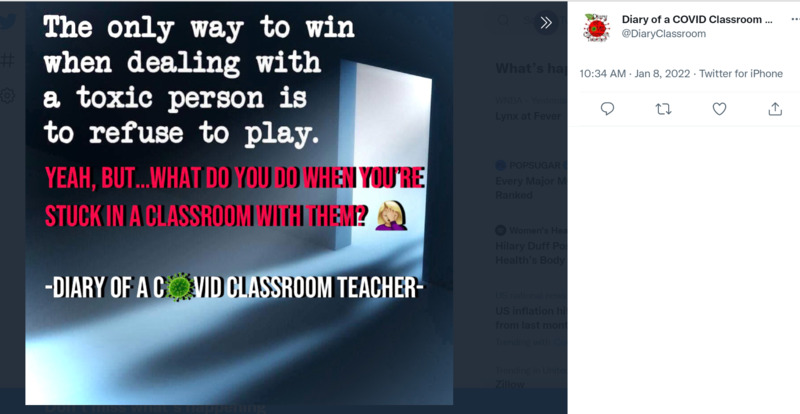 2022-01-08
2022-01-08Frustrations of a Teacher
The item is a screenshot from a Twitter post of someone known as "Diary of a COVID Classroom Teacher". For their post, they had edited a motivational photo to question how to handle a toxic person if they are in your classroom. This post expresses frustrations that are shared by many teachers during the pandemic. With many schools being entirely in-person for the first time in two years, teachers are experiencing a huge amount of behavior issues, most likely caused by lack of routine and social/emotional growth during this time. -
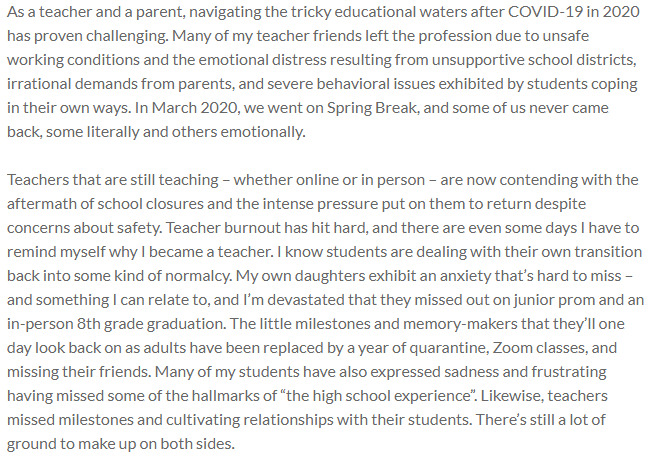 2022-01-16
2022-01-16Still On Spring Break?
As a teacher and a parent, navigating the tricky educational waters after COVID-19 in 2020 has proven challenging. Many of my teacher friends left the profession due to unsafe working conditions and the emotional distress resulting from unsupportive school districts, irrational demands from parents, and severe behavioral issues exhibited by students coping in their own ways. In March 2020, we went on Spring Break, and some of us never came back, some literally and others emotionally. Teachers that are still teaching – whether online or in person – are now contending with the aftermath of school closures and the intense pressure put on them to return despite concerns about safety. Teacher burnout has hit hard, and there are even some days I have to remind myself why I became a teacher. I know students are dealing with their own transition back into some kind of normalcy. My own daughters exhibit an anxiety that’s hard to miss – and something I can relate to, and I’m devastated that they missed out on junior prom and an in-person 8th grade graduation. The little milestones and memory-makers that they’ll one day look back on as adults have been replaced by a year of quarantine, Zoom classes, and missing their friends. Many of my students have also expressed sadness and frustrating having missed some of the hallmarks of “the high school experience”. Likewise, teachers missed milestones and cultivating relationships with their students. There’s still a lot of ground to make up on both sides. -
 2020
2020WIFI Meme
I found this meme to be a funny representation of how important technology became during quarantine. People relied on it to stay connected, complete work, and go to school along with general entertainment to avoid boredom and burnout. -
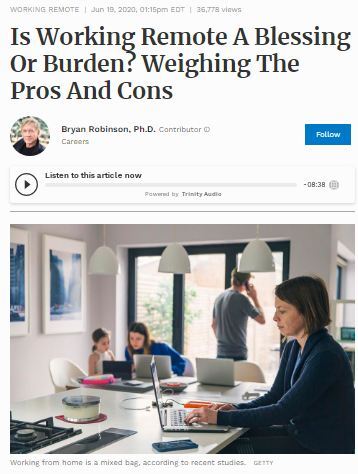 2020-06-19
2020-06-19Is Working Remote A Blessing Or Burden? Weighing The Pros And Cons
This article discusses the pros and cons of changes to productivity caused by the shift to teleworking during the pandemic in countries around the globe. Major themes are mental health and work-life balance. -
2021-01-22
The Silver Lining of Pandemic Community Building
I have a busier schedule now than I did when I left the house for more than grocery runs and work. I spend a lot of my time on Zoom, as we all do, but doing things I was not doing before. In April, quickly after Friday the 13th, my #twitterstorian dreams came true when Dr. Joanne Freeman launched History Matters…. And So Does Coffee with the National Council for History Education. A couple of months later, The Gilder Lehrman Institute launched a weekly series talking with a historian about their book called Book Breaks. I could never attend conferences like the Southern Historical Association annual meeting, and now they were available to me virtually. The Western History Association annual meeting was online in October 2020 and was one of the best conferences and online meeting experiences that I think is possible given the circumstances. I have seen Joanne Freeman and Dr. Heather Cox Richardson speak together frequently over the last few months, and each experience is just as fun as the previous. I am on the board of the Arizona Technology in Education Association. The ability to host events and PD without needing to secure locations and catering has increased the number of events that we host by what feels like tenfold. I also started my Ph.D. in history at ASU, and with those added time blocks to my schedule expanded my little world with cohort and classmates. The pandemic has forced us to come together in new ways. By trying to carry on, those components of our lives shifted to the internet and thus actually made them more accessible to our larger communities than they were before. It has prompted even more of the existing conversations about virtual conferencing from an economic and environmental perspective. Don’t get me wrong, I am eagerly awaiting my 2nd vaccine and the days when I can travel for conferencing, community, and research again, but I think I will frame my plans around a different question. I don’t believe that I will have to ask myself to choose what to attend and not attend. Instead, it will be what things do I want to engage with in person (and what things can I) and what things I will still attend, but from afar. We are closing in on a year in this pandemic, and with the new year, I think it is essential to try and find some kind of silver lining – and it is that I think the communities that we have built over the last year and continue to build will be larger and stronger. Now I suppose I need to mull over the ramifications of overscheduling, burnout, and prioritization. -
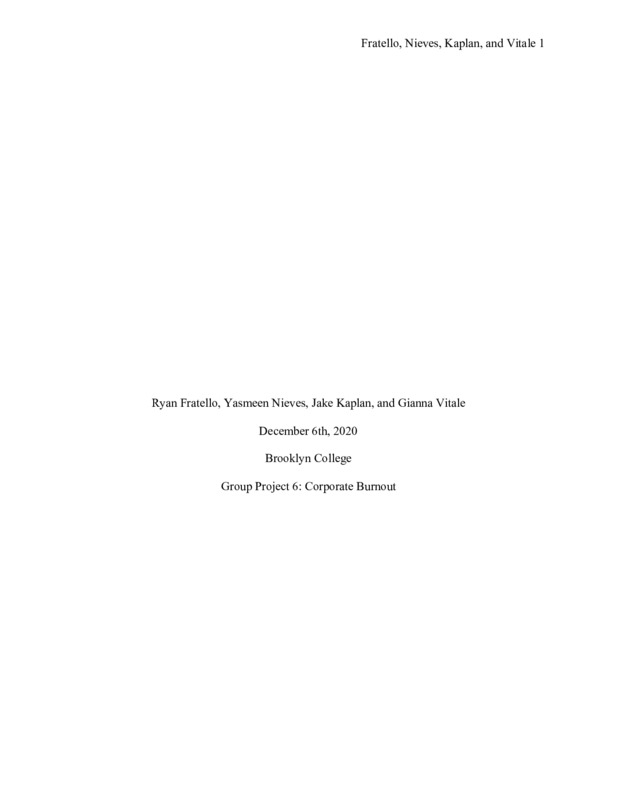 2020-12-10
2020-12-10Burnout: A Sociological Analysis of the 24/7 Work Mentality and Its Impact on the City That Never Sleeps
The item we are submitting is a reflection of society at large, something imperative as we have all been forced to self-reflect on a personal scale during this pandemic. Being forced to recharge and take a breath from the tech-fueled, on-the-go, culture we are entrenched in is a psychological challenge in and of itself. Therefore, starting a conversation as to why work is seen as a means to an end rather than as a self-fulfilling contribution to society and, consequently, something that leads to burnout is a conversation worth having before we enter into a society once again that causes severe stress and anxiety for most people. This is important because we must look at not just our personal lives, but the society we live in so that we can properly address the factors leading to major decline in the mental health of so many, as well as whether or not we want to re-commit to such a society once life returns to some sense of normalcy.
